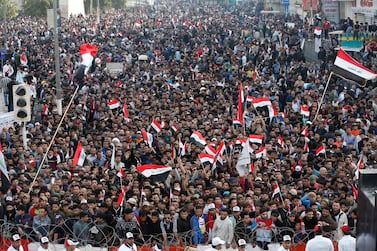If Iraqi Prime Minister Adel Abdul Mahdi does not quickly implement reforms to the system that put him in power then more unrest is likely to break out, which could cost him his position as head of the government.
Waves of anti-government protests that left more than 100 dead rocked the country this month, posing an unprecedented test to the premiership of a veteran politician who came to power last October as a compromise candidate backed by powerful Shiite groups that have dominated Iraq since the downfall of Saddam Hussein in 2003.
Mr Abdul Mahdi has drawn criticism for failing to upend the system since being in office.
It was a deal between Fatah, the political wing of the Shiite militias, and the Sairoon bloc, led by Muqtada Al Sadr, a Shiite cleric and militia leader turned populist politician, who brought the prime minister to power.
But experts say Mr Abdul Mahdi faces constraints imposed by the political parties, leaving him unable to bring any meaningful change to the country's politics and social welfare for ordinary Iraqis.
"Throughout his tenure he has lacked the political base or party backing that would allow him to push through substantive legislation," Fanar Haddad, an Iraq expert at the National University of Singapore, told The National.
“In essence he has been beholden to the system he was supposed to reform,” Mr Haddad said.
The most difficult task he faces will be to persuade angry Iraqis that he is doing enough to reform the system, while at the same time convince the political elite that his changes will not threaten their interests, Harith Hassan, an Iraq expert at the Carnegie Middle East Centre, told The National.
Mr Abdul Mahdi needs to prove to the ruling factions that he can succeed in creating reforms, he said.
“Otherwise, those factions that dominate his government could try to throw him under the bus in order to save themselves,” Mr Hassan said.
Abdul Mahdi seen as powerless to the public
The violence seen in the past two weeks has been Iraq's worst since the ISIS insurgency was clamped down in 2017, and has been Mr Abdul Mahdi's biggest test.
The government’s brutal crackdown left more than 110 dead and 7,000 injured as snipers fired from rooftops at protesters.
“The recent bloodshed has further weakened him. It has tarnished his image, he has long been seen as ineffective, now he will be seen as oppressive too,” Mr Haddad said.
To the public, Mr Abdul Mahdi is “expected to project power and confidence” but instead is seen as a powerless leader, Mr Hassan said.
Iraqis say he has failed to improve their lives even in peacetime, two years after ISIS was declared defeated.
Since assuming office, he has raised a lot of "the right ideas about change Iraq needs - more of a private sector, and expansion of the agriculture and industrial sectors", Kirk Sowell, an expert on Iraq at Utica Risk Services, told The National.
“The problem is that his implementation is very weak, and the lack of any real anti-corruption campaign undermines his credibility,” Mr Sowell said.
What kind of leader does Iraq need?
Iraqis want the return of a leader who could provide some stability and order, and one who has institutional strength and backing from a political party, Renad Mansour, senior research fellow at Chatham House, told The National.
“He must be supported by an independent judiciary so it can play a role in providing some of the legal advice and ruling that is necessary for any government that tries to be democratic,” Mr Mansour said.
Mr Abdul Mahdi must get “his house in order”, he said.
So far, the prime minister’s office announced that nine senior officials were referred to the judiciary for corruption investigation, including two former ministers, two deputy ministers and four former provincial governors.
He also ordered a government reshuffle under which a new education and health ministers assumed office.
Mr Abdul Mahdiannounced a plan for jobs, training and welfare shortly after the protests kicked off.
But the measures are unlikely to calm public anger, directed at a corrupt political class, which could ultimately push the prime minister out of office.






